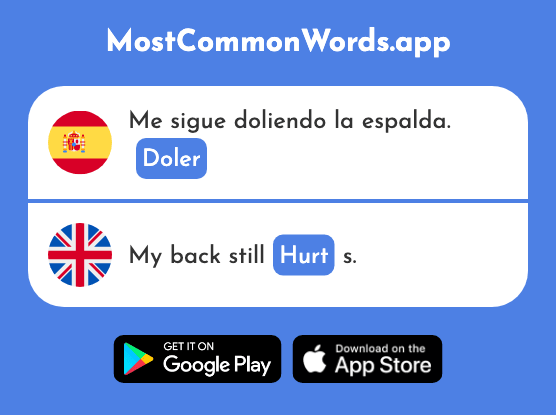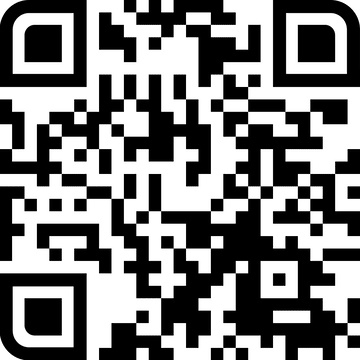Doler - Hurt (La 1629 Palabra Más Común En English)
En Inglés, la palabra Doler es Hurt. Se puede usar como verbo. Esta palabra aparece a menudo cuando se habla de enfermedades & lesiones. Se clasifica como A2 y es la 1629 palabra más utilizada en Inglés. Puede encontrar oraciones de ejemplo a continuación para proporcionar contexto, y también puede escuchar cómo se pronuncia la palabra. Descarga nuestra aplicación para practicar las 3000 palabras más comunes en Inglés, incluida esta, con más de 60 000 oraciones de ejemplo, pronunciaciones y varios tipos de práctica.
Pronunciation
 Española:
doler
Española:
doler
 Inglés:
hurt
Inglés:
hurt
Examples
|
|
|
|---|---|
| Me sigue doliendo la espalda. | My back still hurts. |
| Con la edad, una persona siempre empieza a doler algo. | With age, a person always starts to hurt something. |
| Si el tobillo empieza a doler, deténgase y descanse. | If your ankle begins to hurt, stop and rest. |
| Esto no debería doler ni punzar, pero podría ser incómodo. | This should not hurt or pinch, but may be uncomfortable. |
| Esta zona debería empezar a doler menos después de un rato. | This area should start to hurt less after a while. |
| Y aquí tiene una herida, pero no va a doler. | And here is a wound, but it won't hurt. |
| La piel se vuelve roja y eso puede doler mucho. | The skin gets red, and it can hurt a lot. |
| Puede sentirse incómodo o raro, pero no debería doler. | This may feel uncomfortable or weird, but it shouldn't hurt. |
Descargue nuestra aplicación móvil que presenta todas las palabras más utilizadas












| Los músculos deben doler un poco, pero no debe doler. | Your muscles should hurt a little, but they should not ache. |
| Cuando esto sucede, los huesos podrían doler, molestar o debilitarse. | When this happens, your bones might hurt, ache or become weak. |
| Mi columna comenzó a doler en la región lumbar (espalda baja). | My spine started hurting in the lumbar region (lower back). |
| Voy a lavar tu herida, pero va a doler. | I'm going to bathe your wound, but it's going to hurt. |
| Tienes que mejorar tu posición cuando te sientas o te comenzará a doler la espalda. | You need to improve your position when you're sitting or your back will start to hurt. |
| ¿Estás bien? La caída te ha tenido que doler. | Are you okay? The fall had to hurt. |
| Tiene que doler o nunca aprenderán. | This has to hurt or you'll never learn. |
| Te dije que no debería doler. | The guy told me it wasn't supposed to hurt. |
| Porque pensé que podía doler demasiado. | Because I thought it would hurt too much. |
| No deben doler nadie, también. | They shouldn't hurt anything in the process, too. |
| La piel enrojecida podría doler al tocarla. | The red skin might hurt when you touch it. |
| Principalmente uso ungüentos cuando empieza a doler. | I mainly use ointments when it starts to hurt. |
| Nadie querría doler un profesor inepto. | No one would want to hurt a bumbling professor. |
Descargue nuestra aplicación móvil que presenta todas las palabras más utilizadas














